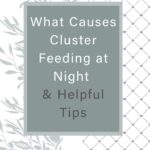“There’s something wrong with my baby. She won’t stop eating, and I’m pretty sure my nipples are about to fall off.”
This is a DIRECT quote from a friend whose darling baby recently started cluster feeding at night. While her sentiments might sound funny, they also hit the nail on the “nursing problems” head.
What is cluster feeding, you might ask?
It’s basically when newborns lose any semblance of a routine, and the schedule we think we’ve created flies out the window.
Scheduled feedings and naps are replaced by periods of frequent feedings, nonstop hunger cues, and incessant fussing that sometimes feels like it might drive you insane.
Instead of eating every 2-3 hours, babies might act hungry as early as every half hour during a cluster. Often, these bouts of insatiability happen during the late afternoon/early evening hours.
But is this breastfeeding development something we should worry about?
Does it mean there’s a problem with our milk?
How long will it last?
Why does it only happen in the evenings?
When things take a sudden turn with our nursing situation, it’s not unusual to feel frustrated to say the least. After all, most of us already have our fair share of breastfeeding concerns and confusion. Any new development can send us into a reasonable tailspin.
Before you consider selling your non-stop eater to the zoo (a solution I’ve pondered occasionally) or to your MIL’s house, let us help.
Below is a list of the most common questions and misconceptions about cluster feeding AND the answers you need to survive the experience!

This site contains affiliate links, meaning that we earn a small commission for purchases made through our site. We only recommend products we personally use, love, or have thoroughly vetted.
- 1. Is Cluster Feeding Something I Should Worry About?
- 2. Are Colic and Cluster Feeding the Same Thing?
- 3. Do Formula Fed Babies Cluster Feed, Too?
- 4. Does Newborn Cluster Feeding Only Happen at Night?
- 5. How Long Will Cluster Feeding Last?
- 6. Is Cluster Feeding Caused by Low Milk Supply?
- 7. Are Baby Clusters and Growth Spurts Connected?
- 8. Will Baby Cluster Feeds Help My Little One Sleep Through the Night?
- 9. Should I Supplement with Formula During Cluster Feeds?
- 10. Am I a Bad Mom for Getting Stressed About Cluster Feeding?
- Cluster Feeding is Normal, But Do What Feels Right for Your Family
1. Is Cluster Feeding Something I Should Worry About?
Let’s start with one of the most common questions about cluster feeding:
Is it something we need to worry about?
When it suddenly seems like your baby is constantly starving, your instinct might be to freak out. After all, can’t an increased appetite signify a health problem?
Before you start panicking too much, please let me put your mind at ease–as a general rule, cluster feeding in newborns isn’t a concern.
Most babies will experience cluster-like behavior at some point.
As long as your seeing signs your baby is getting enough milk, such as dirty diapers, proper development, and alertness, you shouldn’t have anything to worry about. Other indicators include moist lips after feeds and swallowing during nursing sessions.
2. Are Colic and Cluster Feeding the Same Thing?
When discussing extra fussy babies, “buzz words” like witching hour and colic are often used to describe the situation.
While both of these certainly relate to fussiness and discontent, they aren’t umbrella terms that cover any example of irritability during a baby’s early weeks and months of life. For example, lots of new parents confuse cluster feeding and colic.
On the contrary, though, colic and cluster feeding are NOT the same thing.
Colic is a condition in newborns identified by excessive bouts of crying–often for no apparent reason. While this frequently happens during the evening, it’s not unusual for colicky babies to cry for hours throughout the day.
While fussy evenings might come with cluster feeding at night, it doesn’t usually last long. Typically, once your baby eats, they’ll relax (until they’re ready to eat again, that is!).
3. Do Formula Fed Babies Cluster Feed, Too?
Sometimes! While cluster feeding seems more common with breastfed babies, that doesn’t mean babies who drink formula don’t experience it, too.
Just be careful not to let your formula-fed baby overeat if they start to cluster. It takes longer for newborn babies to digest formula, so they can get bellyaches if they eat too much.

4. Does Newborn Cluster Feeding Only Happen at Night?
Most babies want to cluster during the late afternoon or early evening hours before bedtime. That doesn’t mean that they won’t cluster feed during other times of the day.
Since the sucking reflex helps comfort babies, your little one might want more frequent feedings anytime they feel out of sorts or under the weather.
5. How Long Will Cluster Feeding Last?
While cluster feeding can happen sporadically, it doesn’t usually last long when it starts. Typically, babies will cluster for a few hours at a time, and the process will end after just a couple of days.
6. Is Cluster Feeding Caused by Low Milk Supply?
When it comes to misconceptions about cluster feeding in babies, one of the most widespread rumors is that it’s caused by low milk production. Many of us mamas believe our babies eat more because they don’t get enough at each feed.
This, however, is a lie!
A baby’s cluster has nothing to do with how much milk you produce. In fact, the more your baby nurses, your body will instinctually produce more breast milk to keep up with the demand.
So rest assured, mama, there are many reasons your baby might be cluster feeding, but low milk supply isn’t one of them.
7. Are Baby Clusters and Growth Spurts Connected?
Absolutely! Growth spurts are one of the most common reasons your baby might not be waiting for long stretches between meals.
During the first year of a baby’s life, they’ll likely experience four growth spurts: one at three weeks, six weeks, three months, and six months. With so many physical and developmental changes in their bodies, their regular feeding schedule might not provide enough calories.
Thanks to cluster feeding sessions, they can ensure they get all the nutrition they need for their growing bodies.
8. Will Baby Cluster Feeds Help My Little One Sleep Through the Night?
Let’s think about this moment–why do babies wake up during the night so much in those early months of life?
Usually, to eat and get their diapers changed!
They must fill their tummy before bed as they transition to sleeping through the night. The easiest solution? Cluster feeding!
By cluster feeding at night, your little one will get plenty of extra nutrition before laying down for longer stretches.
9. Should I Supplement with Formula During Cluster Feeds?
Supplementing with formula is unnecessary if your little one starts cluster feeding in the evening. As stated earlier, your baby’s cluster isn’t related to low milk supply.
If you start supplementing with formula, it could lead to milk production problems. Since formula is harder to digest, your baby might be less interested in their regular nursing sessions.
10. Am I a Bad Mom for Getting Stressed About Cluster Feeding?
When my eldest daughter started to cluster feed, I felt like I was losing my mind. It felt like there was no time to do anything but sit on the couch with my boobs out. Even eating dinner was an Olympic-worthy event as I navigated bites with a baby strapped to my breast.
The moral of the story is this: there is no shame in feeling overwhelmed and frustrated by your little one’s cluster feeding sessions.
Yes, cluster feeds are a natural part of being a baby, but that doesn’t make them any less irritating to moms sitting around breastfeeding for hours.
If you’re looking for ways to survive the stress of a cluster-feeding infant, try the tips below:
- Let Your Partner Help: Whether holding the baby between feeds or giving them a bottle, there’s plenty your partner can do to help during the baby’s meals.
- Create a Nursing Station: Set up a breastfeeding area in your home where you can hang out during your baby’s nightly cluster. Include healthy breastfeeding snacks, a water bottle, a cell phone charger, a tablet, and a comfy nursing pillow.
- Use White Noise: Since cluster feeds often go hand-in-hand with fussiness, why not play white noise? This sound can help your baby relax, which lets you relax, too!
- Try Babywearing: If you’ve mastered the art of babywearing your newborn and breastfeeding simultaneously, placing your baby in a carrier during their cluster is a great way to provide the extra feeds they want while still getting things done around the house!
If you’re feeling severely stressed or struggling to make cluster feeding work, don’t hesitate to contact your physician or a lactation consultant.

Cluster Feeding is Normal, But Do What Feels Right for Your Family
Another common question is this–should I “stop” my baby from cluster feeding?
At the end of the day, there is no “right” way to parent. What’s hard, however, is escaping the judgment many of us experience when our choices don’t align with the so-called norms.
When our daughter was cluster feeding, one doctor told me we needed to stop the behavior.
They suggested using various relaxation techniques to distract and calm her instead of giving in to her continual hunger cues. We tried this for a day, but it didn’t work for our family, so I got a second opinion.
The second doctor told me there was nothing wrong with letting her cluster and that it was normal infant behavior.
There will be two sides to any situation. You just have to pick the best path for you and your loved ones.
There’s nothing wrong with letting your baby cluster feed, but it’s also okay to take a different approach if that’s what works best. You are the only person who can decide which option is right for your unique situation.
Are you in the middle of cluster feeding at night? How has the experience been for you?










